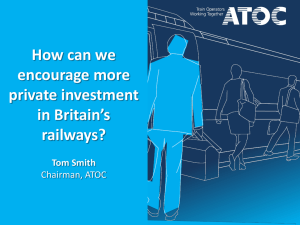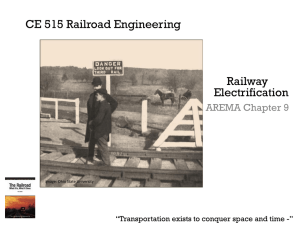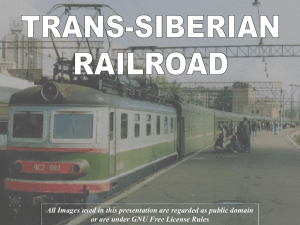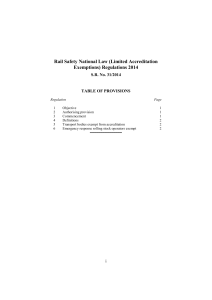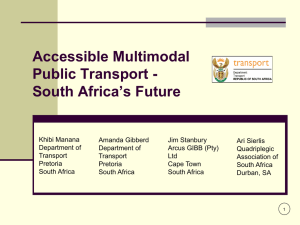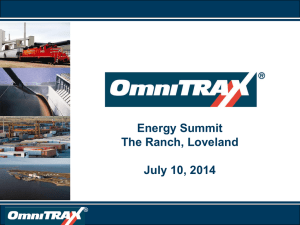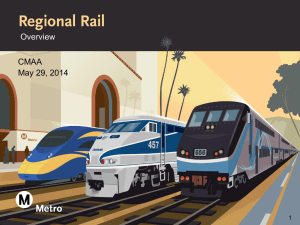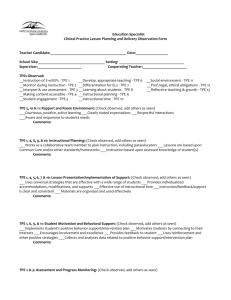Northern TPE Consultation Co-ordinator Department for Transport 4
advertisement
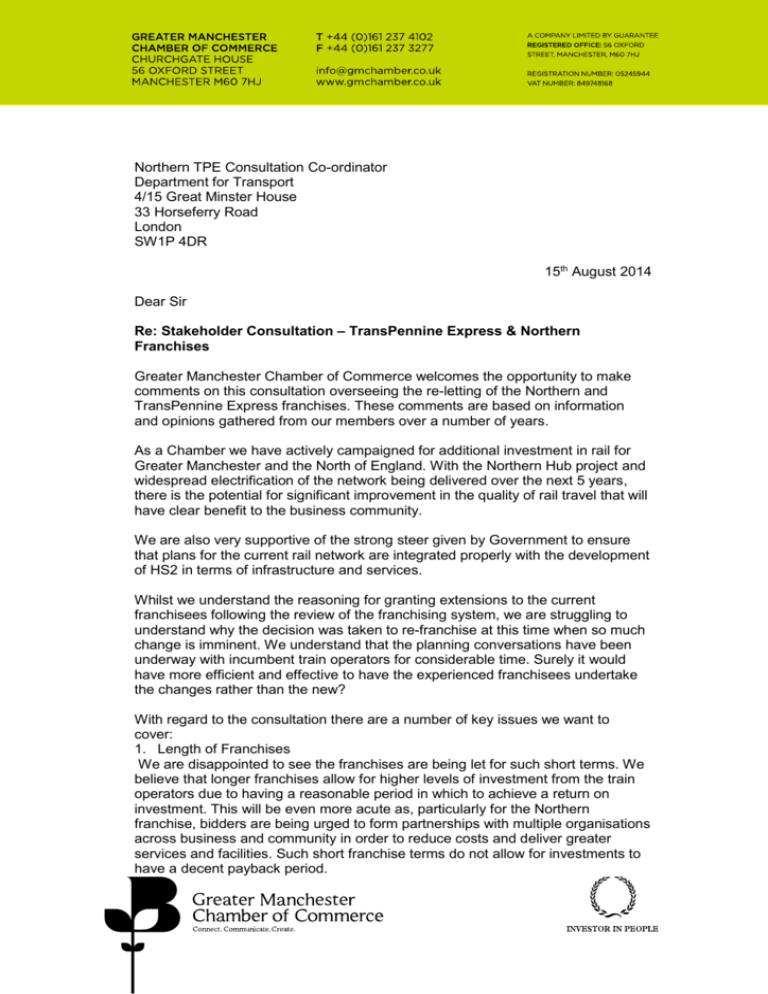
Northern TPE Consultation Co-ordinator Department for Transport 4/15 Great Minster House 33 Horseferry Road London SW1P 4DR 15th August 2014 Dear Sir Re: Stakeholder Consultation – TransPennine Express & Northern Franchises Greater Manchester Chamber of Commerce welcomes the opportunity to make comments on this consultation overseeing the re-letting of the Northern and TransPennine Express franchises. These comments are based on information and opinions gathered from our members over a number of years. As a Chamber we have actively campaigned for additional investment in rail for Greater Manchester and the North of England. With the Northern Hub project and widespread electrification of the network being delivered over the next 5 years, there is the potential for significant improvement in the quality of rail travel that will have clear benefit to the business community. We are also very supportive of the strong steer given by Government to ensure that plans for the current rail network are integrated properly with the development of HS2 in terms of infrastructure and services. Whilst we understand the reasoning for granting extensions to the current franchisees following the review of the franchising system, we are struggling to understand why the decision was taken to re-franchise at this time when so much change is imminent. We understand that the planning conversations have been underway with incumbent train operators for considerable time. Surely it would have more efficient and effective to have the experienced franchisees undertake the changes rather than the new? With regard to the consultation there are a number of key issues we want to cover: 1. Length of Franchises We are disappointed to see the franchises are being let for such short terms. We believe that longer franchises allow for higher levels of investment from the train operators due to having a reasonable period in which to achieve a return on investment. This will be even more acute as, particularly for the Northern franchise, bidders are being urged to form partnerships with multiple organisations across business and community in order to reduce costs and deliver greater services and facilities. Such short franchise terms do not allow for investments to have a decent payback period. 2. Capacity There are plans underway to address some of the capacity problems on the network however it is clear that both franchises suffer from problems of overcrowding on key routes into, and between, the major Northern cities. This is most acute during morning and evening peaks but is common on some routes for large parts of the day. The Northern Hub will create additional capacity for upto 700 additional services each day, and electrification will enhance that with faster journey times. We are keen to see that further electrification is delivered to improve passenger experience, reduce carbon emissions and build resilience across the network. However we have a significant issue over our rolling stock. Northern suffers most due to its old “hand-me-down” rolling stock that is not suitable for modern travel needs such as handling large numbers of commuting passengers or being accessible to those with limited mobility. It is important that the new Northern franchise has provision for new rolling stock that is fit for purpose, increases capacity and is accessible to all. We also believe that it is fundamental that the leasing of rolling stock is tied to the franchise term including extensions. This will ensure that the ridiculous situation that occurred with TPE earlier this year where some of its trains were transferred to Chiltern Railways does not happen again. The UK needs a long term rolling stock strategy that supports the effective procurement of trains that can be bought “off-the-shelf” and do not have complicated, and often unnecessary, specifications that massively inflate costs. We believe that, alongside the plans for HS2, proper plans for rolling stock can revive the UK’s carriage building industry and its extensive supply chain that would provide a long term boost to what was a declining industry, providing jobs and improving skills. Only 40% of a train’s value is in its build, the remaining 60% comes from the wider supply chain. 3. Smart Ticketing Steps needs to be taken to ensure the rapid introduction of smart ticketing on all franchises, but particularly for the transpennine axis of cities in the North. Over a decade has passed since the introduction of the Oyster Card in London but the difficulties of governance, deregulation of buses, arbitrary boundaries and funding seem to have conspired to condemn the North to a confusion of pricing and purchasing options. With over 70% of the UK now owning a smart phone and Government imperative via the franchising system, smart ticketing could be introduced swiftly. This would help to increase revenue collection, bringing in additional fares, and reduce demand for ticket office staff, freeing them up to a broader customer service role and potentially reducing staff costs. We also have some comments on specific issues and routes: Role of Rail North – we are supportive of decision making being made at a local level and hope that a true partnership exists between DfT and Rail North. In time we would like to see more powers transferred to Rail North subject to clear agreements on governance, finance, risk and a strategic role for business. Direct services to Manchester Airport – evidence gathered shows that where there is a direct rail service between the airport and a destination, then passenger numbers grow more quickly. Changing services for airline passengers is a major disincentive. With the development of the Airport City Enterprise Zone, strong rail connections to Manchester Airport will be increasingly important to maximise the potential of the site and its new businesses looking to grow their customer base. There is currently a poorer rail service to the South and West of the airport than across the Pennines, and this is a major contributor to the heavy congestion experienced on the motorway network, specifically the M6 and M56, as air passengers are forced to drive. The direct route to Scotland is highly valued and this TPE service offers additional capacity for passengers in southern Scotland to access the major economic areas of Glasgow, Edinburgh, Manchester & Liverpool. Major overcrowding occurs on services from Bolton into Manchester particularly in the morning peak. Recent service changes due to electrification have reduced services, increasing overcrowding and resulting in passengers unable to board trains. Services from North West Lancashire and Cumbria must offer improved capacity to Bolton particularly as the station is undergoing an upgrade as part of major investment in the Town Centre which will create jobs requiring more commuting capacity. There are grave concerns about the reduction or removal of TPE services from Stalybridge. The consultation suggests that Northern might be used for leading the transfer to electrified services. If that is the case then we would suggest that the enhanced (in terms of quality and capacity) Northern services were introduced to Stalybridge as the TPE services were reduced to mitigate those concerns. There are also aspirations from local businesses in Stockport and Tameside for a new service from Stockport to Manchester Victoria via Denton and Reddish South stations. Whilst Denton and Reddish are currently lightly used, there is considerable investment being attracted to the eastern side of the city, creating jobs that need to be accessed so we would be keen to see if a business case could be built whilst the largest scale re-mapping of services in living memory is underway. The main issues discussed form a significant part of our Business Manifesto produced in advance of the General Election 2015. I hope that you will find our comments useful and would be happy to discuss them further. Yours sincerely Clive Memmott Chief Executive
